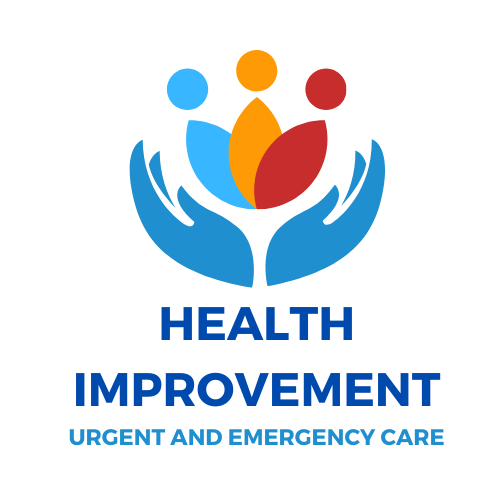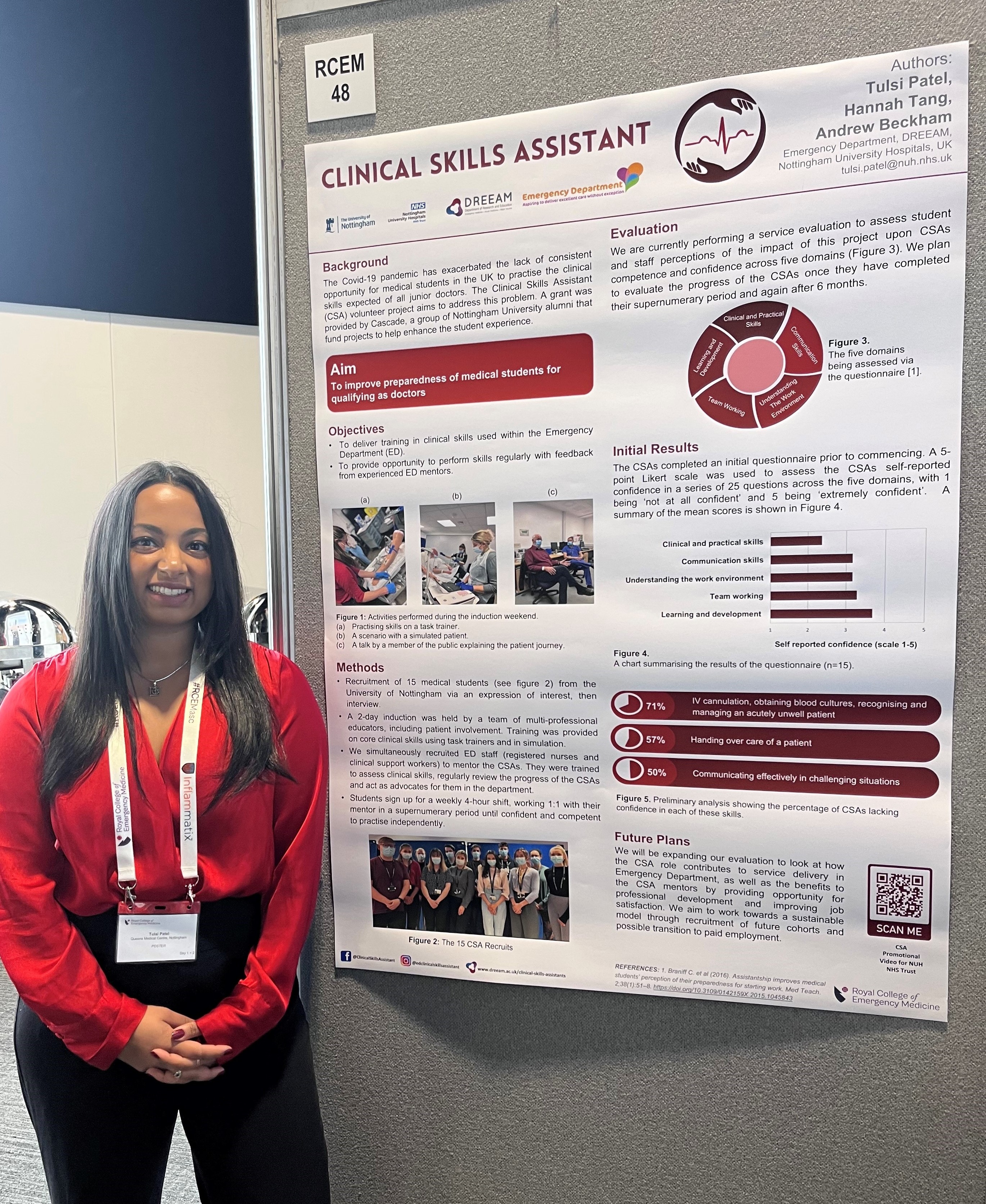Over the years, there have been a lot of fantastic publications, posters, case reports and articles produced by members of the team in DREEAM and the Nottingham University Hospitals Emergency Department. The aim of this page is to provide a platform for some of this work and to recognise the contribution our colleagues have made to the wider Emergency Medicine (EM) community.
If you are a colleague and wish to showcase a piece of work on this page, please contact nuhnt.dreeam.digital@nhs.net and we will be delighted to upload it.
One excellent way of getting your work published on an international forum is by submitting a clinical case or single-best-answer to RCEMLearning. The templates for both of these can be found below with all the details you need for submission. It is not uncommon for work to be published within 2 weeks of submission, so it is the perfect way to quickly improve your portfolio in time for application to specialty training. One of our SpRs, Nick Tilbury is a member of the editorial team for the RCEMLearning clinical cases so feel free to email him (nicholas.tilbury@nhs.net) with any questions or drafts of cases that you need help with.
Are you interested in submitting a Clinical Case or a SBA (Single Best Answer)?
Latest Abstracts
A&E Obstetric & Gynaecological Emergencies - A quick reference and documentation tool for UK Emergency Medicine by Jake Turner (September 2025)
Two case reports by Dr Himanshu Gul Mirani that were presented at Emirates Society of Emergency Medicine (ESEM) conference in Dubai December 2024.
Implementing a Health Improvement Curriculum in the Emergency Department by Laura Walker and Lucy Morris
References:
1. NHS England (2016) Making Every Contact Count (MECC) [Online] Available at: Main heading (england.nhs.uk)
2. Blake H, Yildirim M, Premakumar V, Morris L, Miller P, et al. (2023) Attitudes and current practice in alcohol screening, brief intervention, and referral for treatment among staff working in urgent and emergency settings: An open, cross-sectional international survey. PLOS ONE 18(9)
3.Institute of Medicine (IOM) (2019 ) Broadening the Base of Treatment for Alcohol Problems. Washington DC: National Academies Press
4.DREEAM (2023) HEALTH Model [Online] Available at: Health Improvement | DREEAM
5. Adams, E.J., Miller P., Coffey, F., Morris, L., Marshall, G. and Blake, H. Alcohol prevention in urgent and emergency care settings. The University of Nottingham and Nottingham University Hospitals NHS Trust. Version 1
6. Windle RJ, McCormick D, Dandrea J and Wharrad, H. (2011), The characteristics of reusable learning objects that enhance learning: A case-study in health-science education. British Journal of Educational Technology, 42: 811–823.
The Clock is Ticking: Piloting Time-Critical Parkinson's Disease Medicine Practice in ED by Dr Dolly C Yadav (EM CESR Fellow), Mr. Kunal Gohil (EM Clinical Pharmacist), Dr Ashraf Ali (EM Consultant) and presented at OSEM Conference 2024
Key Learning Points:
- Administer levodopa within 30 mins of their individual scheduled time as per NICE quality standard
- Clinical Pharmacist Service in ED improves time critical PD meds practice & patient safety
- Review & develop PD time-critical medicine practice policy in your ED
POCUS Of Sternoclavicular Joint To Assess Dislocation by Maria Pia Gauci and Dr. Himanshu Gul Mirani and presented at the Oxford School of Emergency Medicine conference on 26th March 2024
Posterior dislocation of the sternoclavicular joint is a life-threatening emergency since it can be associated with injuries to several important mediastinal structures like the subclavian vessels, trachea, and oesophagus (1). It warrants an emergency reduction
Posters presented by Dr. Himanshu Gul Mirani and presented at the Oxford School of Emergency Medicine conference on 26th March 2024
Health Improvement Hub (HIC)
Attitud es and current practice in alcohol screening, brief intervention, and referral for treatment among staff working in urgent and emergency settings: An open, cross-sectional international survey
es and current practice in alcohol screening, brief intervention, and referral for treatment among staff working in urgent and emergency settings: An open, cross-sectional international survey
The aim of the study was to ascertain the views and experiences of those working in urgent and emergency care (UEC) settings towards screening, brief intervention, and referral to treatment (SBIRT) for alcohol, to inform future practice.
Published here on 27th September 2023
Effectiveness and implementation of interventions for health promotion in urgent and emergency care settings: an umbrella review
Urgent and emergency care (UEC) settings provide an opportunity to prevent ill-health and promote healthy lifestyles with potential to screen and deliver interventions to under-served, at-risk populations. The aim of this study was to synthesise and summarise the evidence on the effectiveness and implementation of interventions for health promotion in UEC settings.
Published here on 6th April 2023
Exploring Health Information Seeking Among Participants from a Black Ethnic Group in the UK: a Qualitative Study by Antony Ndungu, Laura Nellums & Louise Bramley and presented at the International Congress of Nurses' (ICN) in Montreal, Canada
Empirical evidence has shown that individuals from minority ethnic communities have been at an increased risk of COVID-19 infections and adverse clinical outcomes including hospitalization, intensive care unit admission, and mortality. The COVID-19 vaccine has been heralded as key in ending the global pandemic. However, evidence suggests that although minority ethnic communities have been disproportionately affected by COVID-19, vaccine delivery to these communities has been poor. A barrier to the vaccine uptake has been health information. Health information is an important variable in the health decision-making process. Lack of or wrong health information has serious implications. Health information leads to better understanding of personal health and appropriate utilization of health services and consequently improves an individual’s health outcomes. This study sought to explore the health information seeking practices among participants from a Black ethnic minority community in the UK. This study interviewed six Black Africans from the UK. The study explored and highlighted the thoughts, perceptions, and experiences of the participants while health information seeking. This study found challenges in health information access, assumptions about health information and feelings of being dismissed, and an information void. Participants acknowledge that there is a lot that could be done to improve their health information experiences. Targeted health information and measures such as cultural sensitivity and competency could be important in improving health information seeking, not just for Black Africans but all ethnic minorities in the UK.
Published here on 14th July 2023
Critical Care Advanced Clinical Practitioners DREEAM and deliver research poster by Steph Burrows, Megan Meredith, Anna Bolland and presented at the Engage, Enthuse, Empower (EEE) Conference 2023
Advanced Practice encompasses four pillars of practice; this suggests equal weighting to each pillar, however in practice priority is placed on the clinical pillar with less focus on leadership, education and the often most neglected pillar, research. A review of recent literature found that ACPs find problems accessing research due to service demands, limited resources and clinical time pressures. Many ACPs feel scared of research and lack confidence in their ability, use and knowledge of the research process. ACPs often lack support from hospitals, departments and ethics committees to perform research, and for dissemination of research findings.
Effectiveness and implementation of interventions for health promotion in urgent and emergency care settings: an umbrella review by Emma J. Adams, Lucy Morris, Goolnora Marshall, Frank Coffey, Philip D. Miller and Holly Blake
Urgent and emergency care (UEC) settings provide an opportunity to prevent ill-health and promote healthy lifestyles with potential to screen and deliver interventions to under-served, at-risk populations. The aim of this study was to synthesise and summarise the evidence on the effectiveness and implementation of interventions for health promotion in UEC settings.
Posters presented at EM2C conference by Dr. Himanshu Gul Mirani et al
A selection of posters created by Dr. Himanshu Gul Mirani et al which he presented at the EM2C conference.
Posters presented at Oxford School of Emergency Medicine conference by Dr. Himanshu Gul Mirani et al
A selection of posters created by Dr. Himanshu Gul Mirani et al which he presented at the Oxford School of Emergency Medicine conference.
About Dr Himanshu Mirani...
Dr Himanshu Mirani is a Fellow of the Royal College of Emergency Medicine UK, and Fellow of the European Board of Emergency Medicine. Given how varied the presentations are in ED, he believes in a generalist profile of emergency medicine physicians. It reflects in his various qualifications like Dip in Child Health, Dip in Family Medicine, Dip in Geriatric Medicine, Dip in HIV/ AIDS and family education. He is currently pursing Dip in Resuscitation from Queens Mary University of London.
Apart from academics, Dr Mirani has a keen interest in point of care ultrasound and considers it an extension of the examining hand.
He also has a keen interest in areas around healthcare systems and financials, medical education, and legal aspects in medicine. To further these interests, he has an MBA in Healthcare Services, Dip in Legal Medicine and is a Fellow of the Higher Education Academy with a PG Cert in Medical Education from University of Warwick.
Poster presented at Oxford School of Emergency Medicine conference by Dr Dolly C Yadav et al
The Clinical Skills Assistant (CSA) Initiative by Tulsi Patel

The Clinical Skills Assistant (CSA) initiative recruited medical students as volunteers to work in ED, with feedback from experienced professionals focusing on strengthening their clinical skills.
Along with improving confidence and competence of medical students, we have seen the benefits to service delivery and staff professional development in the department, with QMC ED leading the way in interprofessional working and medical education.
Presenting this project, QMC ED has been represented at 3 regional, 2 national and 3 international conferences, including the RCEM scientific conference in Belfast.
The project has won 2 awards for best presentation and best poster from the Undergraduate Medical Education Centre (UMEC) and Institute of Care Excellence (ICE).
About Tulsi...
Tulsi is a final year graduate entry medical student at University of Nottingham. She has a BSc in Biomedical Science and 5 years experience working in the Emergency Department (ED), she is currently a Clinical Support Worker at Queens Medical Centre within ED.